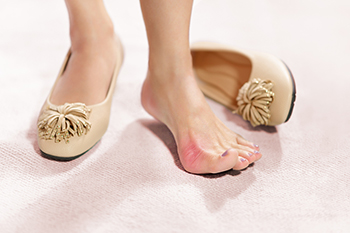
Bunions, or hallux valgus, disproportionately affect women, significantly impacting their overall foot health. Women are particularly susceptible due to factors like frequent wearing of high-heeled or narrow shoes, along with genetic predispositions. The risk of bunions has been shown to increase with age. The formation of a bunion starts with the big toe bending toward the smaller toes, which leads to a painful bony protrusion on the side of the foot. As bunions progress, they disrupt the alignment and function of adjacent toes. This often leads to formation of hammertoes or claw toes, altered weight distribution, corns and calluses. Research suggests that the severity of bunions correlates with increased pain not only in the feet but also in other parts of the body. Family history and flat feet are other contributing factors to the development of bunions. Addressing bunion deformity through early and effective interventions can offer significant relief and improve overall quality of life. If you are experiencing bunion-related discomfort, it is suggested that you make an appointment with a podiatrist for an exam and treatment.
If you are suffering from bunions, contact one of our podiatrists of Pennsylvania. Our doctors can provide the care you need to keep you pain-free and on your feet.
What Is a Bunion?
A bunion is formed of swollen tissue or an enlargement of boney growth, usually located at the base joint of the toe that connects to the foot. The swelling occurs due to the bones in the big toe shifting inward, which impacts the other toes of the foot. This causes the area around the base of the big toe to become inflamed and painful.
Why Do Bunions Form?
Genetics – Susceptibility to bunions are often hereditary
Stress on the feet – Poorly fitted and uncomfortable footwear that places stress on feet, such as heels, can worsen existing bunions
How Are Bunions Diagnosed?
Doctors often perform two tests – blood tests and x-rays – when trying to diagnose bunions, especially in the early stages of development. Blood tests help determine if the foot pain is being caused by something else, such as arthritis, while x-rays provide a clear picture of your bone structure to your doctor.
How Are Bunions Treated?
- Refrain from wearing heels or similar shoes that cause discomfort
- Select wider shoes that can provide more comfort and reduce pain
- Anti-inflammatory and pain management drugs
- Orthotics or foot inserts
- Surgery
If you have any questions, please feel free to contact one of our offices located in Plymouth Meeting and Ambler, PA . We offer the newest diagnostic and treatment technologies for all your foot care needs.
